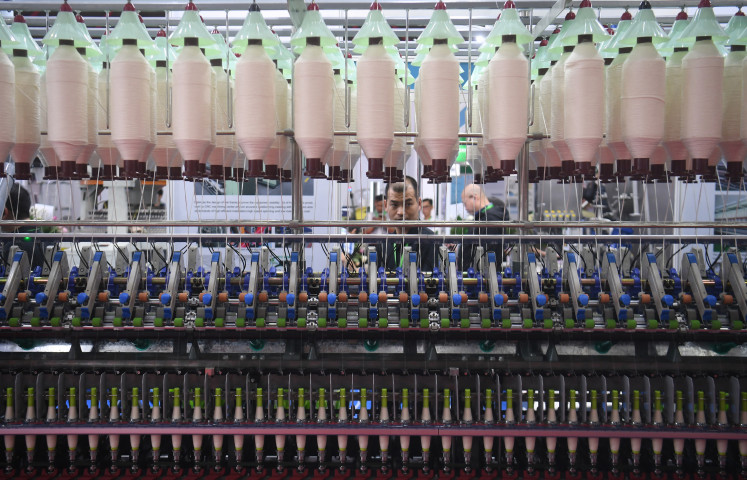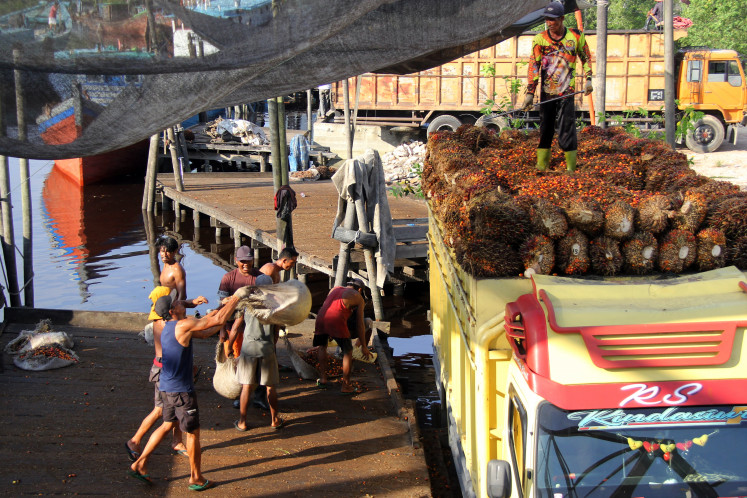Popular Reads
Top Results
Can't find what you're looking for?
View all search resultsPopular Reads
Top Results
Can't find what you're looking for?
View all search resultsNew research finds herbal remedy for lupus
Natural remedy: A man holds up cecendet berries in Bandung, West Java
Change text size
Gift Premium Articles
to Anyone
N
atural remedy: A man holds up cecendet berries in Bandung, West Java. Cecendet is a herbaceous plant known for its medicinal qualities. (JP/Arya Dipa)
In time for World Lupus Day on May 10, the Bandung Institute of Technology (ITB), Padjadjaran University (Unpad) and the Syamsi Dhuha Foundation (SDF) released research on Sunday that found that the herb cecendet is effective in treating symptoms of lupus.
The three organizations worked together with state-owned pharmaceutical company PT Kimia Farma to produce a cecendet extract capsule called Lesikaf for use by people with lupus.
“This initiative [..] has been a long process that started four years ago, finally it can begin production and end up in the hands of people with lupus,” SDF chairwoman Dian Syarief said on Sunday.
Lupus is a chronic autoimmune disease that causes the immune system to attack healthy tissue and organs. The most common symptoms include joint pain, swelling and arthritis.
The World Health Organization (WTO) estimates that there are about 5 million people with lupus worldwide with around 100,000 new cases every year. According to Health Ministry data, there are approximately 1.3 million people with lupus in Indonesia, about 0.5 percent of the population.
Unpad researcher Rachmat Gunadi said that over the course of a two-year-clinical study, his team had found that cecendet helped lessen fatigue in lupus patients and also had anti-inflammatory, antioxidant and antifibrotic effects.
Rachmat also said the study had found no negative side effects with cecendet consumption.
“We checked its effects on the liver, kidneys and sugar and cholesterol levels,” he said.
He added that cecendet extract could be used to treat other autoimmune diseases like scleroderma, whose symptoms include hardening and thickening of skin and internal organs.
Dian said that people with lupus had long looked for alternative medication from herbs or jamu (traditional herbal drinks), but indiscriminate use of such remedies often ended up making their symptoms worse.
“For most people, jamu makes them feel more energetic and strong, because it improves their immunity. But people with lupus don’t need immunostimulants but rather immunosuppressants to control their excessive immune system,” she said. “That is what prompted us to conduct research into cecendet.”
ITB School of Pharmacy researcher Elin Yulinah said that cecendet was chosen as it did not have any immunostimulant qualities.
“We first experimented on cocor bebek and cecendet,” she said. “Cecendet was chosen because the dosage was smaller than cocor bebek and it is easy to obtain.”
Currently two drugs specifically meant for lupus treatment are covered under the Health Care and Social Security Agency (BPJS Kesehatan); chloroquine and hydroxychloroquine, both of which are immunosuppressants.
BPJS Kesehatan spokesperson Nopi Hidayat said that, in principle, treatments for all diseases, including lupus, were covered by the agency.
Food and Drug Monitoring Agency head Penny Lukito said her institution was committed to supporting the development of herbal medicine like Lesikaf, especially given the technological limitations of Indonesia’s pharmaceutical industry.
“It is difficult for us to catch up [with the global industry], so one of the priorities is plant-based drugs,” she said. “Since we have so much biodiversity, we can use it to develop alternative medications for Indonesians.”
Kimia Farma president director Honesti Basyir also said that his company was committed to the development of herbal remedies, with a herbal-focused factory currently under construction.
“We also thank the Syamsi Dhuha Foundation for involving us in this development,” he said.










